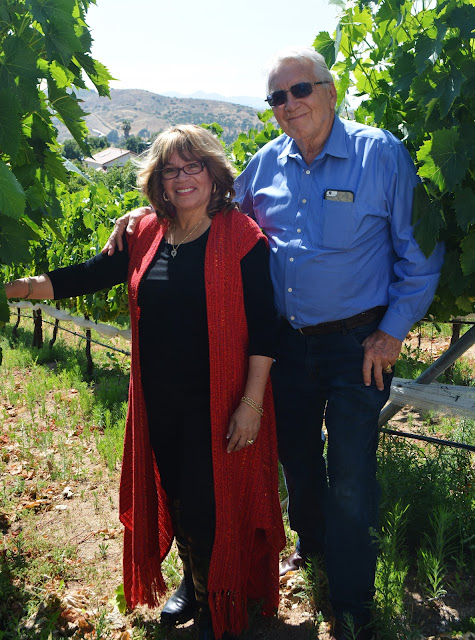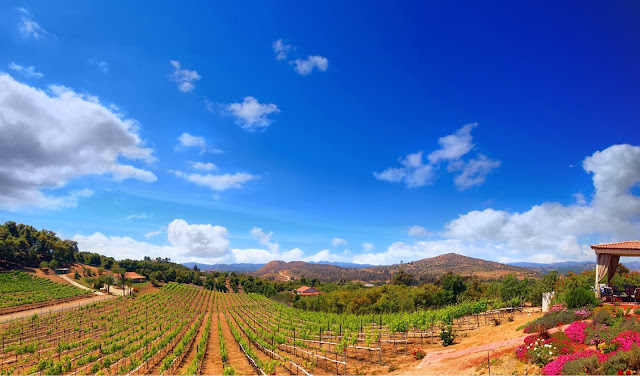I discovered that Altipiano was working with some Italian grapes within Escondido, CA in San Diego county and I reached out to the owner and winemaker, Denise Clarke, to have the opportunity to learn more about their wines.
Denise and her husband Peter moved to the Highland Valley area in Escondido, CA in 1997. Their dream was to always own a vineyard and it was further inspired by their trip to Italy in March of 2007 when they fell in love in particular with the Tuscan town of Montalcino. The unfortunate happenings of the 2007 wildfires destroyed their avocado grove, but gave them the opportunity to pursue their dream.
 |
| Denise and Peter Clarke - Copyright of Altipiano |
It seems that you grew up with farming as a way of life. What
was your background prior to owning Altipiano?
My husband and I purchased our land in 1997, it was an avocado
groove with 1100 trees. Our landscape was changed in October 2007 when a
wildfire ripped through San Diego county and destroyed our avocado groove which
prompted us to plant a vineyard. The vineyard was planted on 2.5 acres with
2600 vines of Sangiovese (Brunello Clone), 640 vines of Barbera, 240 vines each
of Cabernet Sauvignon and Petite Sirah.
We produce approximately 10-12 tons from the Estate grapes and purchased
another 10-12 tons of fruit from Paso Robles and Amador County. Our total
property is 5 acres.
My career started in the US Air Force, I served on active duty for
6.5 years. I have a BA in Human
Resources Management and after leaving active duty, I began working in Human
Resources for Department of Defense until my retirement in June 2012.
Being the winemaker of Altipiano, what is your background in
winemaking and the wine industry?
I had no background in the wine industry at all, nor in winemaking. I knew little or nothing about making wine, but I always loved having my hands in the soil. I considered myself an amateur farmer planting all the trees and vegetation. Thank goodness for mentors. I began going to the Garagiste festival in Paso Robles and attending seminars to learn. We had a winemaker for two years and subsequently in 2012 I took over. Winemaking choose me and it has been a steep learning curve of which I’m still a student and pursuing the music of the vines and wine.
I had no background in the wine industry at all, nor in winemaking. I knew little or nothing about making wine, but I always loved having my hands in the soil. I considered myself an amateur farmer planting all the trees and vegetation. Thank goodness for mentors. I began going to the Garagiste festival in Paso Robles and attending seminars to learn. We had a winemaker for two years and subsequently in 2012 I took over. Winemaking choose me and it has been a steep learning curve of which I’m still a student and pursuing the music of the vines and wine.
What drove you and Peter to invest and open a winery and why
primarily Italian grapes?
Both Peter and I fell in love with Italian varietals while in Italy. Peter didn’t particularly like red wines until he tasted a Brunello. I had fallen in love with Barbera prior to Italy and once we traveled to Italy, we were both hooked.
After losing your avocado grove and replanting vines, how did you determine if the soil and land was suitable for vines? Both Peter and I fell in love with Italian varietals while in Italy. Peter didn’t particularly like red wines until he tasted a Brunello. I had fallen in love with Barbera prior to Italy and once we traveled to Italy, we were both hooked.
After the fire, we contracted with a vineyard consultant, took a vineyard management class and had our soil analyzed. Our avocado groove was 20 years old when we bought in 1997, so the soil was very fertile. We are decomposed granite with approximately 40 years of organic from the leaves falling yearly. Once our soil analysis came back, we knew what rootstock/clones to look for and we contracted with Novavine out of Santa Rosa CA to graft our Brunello Clone (VCR6) on rootstock 1103p. All our vines are either 1103p or 110R rootstock.
 |
| Copyright of Altipiano |
You mention sustainability on your website. Is this
something that Altipiano practices and if so how?
There was an eco-system in place when we purchased the avocado groove. Natural predators being Raptures, Owls, Bees, feral cats for the rodent and natural vegetation. Up until last year, we had a herd of Llamas and chickens who were vegetarian, and their waste would be redistributed in the vineyard. We have crops between our rows for nutrients and oxygen in the soil. Lots of wild life live in our dirt. We are not organic, due to the many vectors already in the area that are host for grassy wine sharp shooter, skeletonizer etc. However, our goal is to be as gentle to the land as possible and to keep the land as healthy as possible for our kids/grandkids.
There was an eco-system in place when we purchased the avocado groove. Natural predators being Raptures, Owls, Bees, feral cats for the rodent and natural vegetation. Up until last year, we had a herd of Llamas and chickens who were vegetarian, and their waste would be redistributed in the vineyard. We have crops between our rows for nutrients and oxygen in the soil. Lots of wild life live in our dirt. We are not organic, due to the many vectors already in the area that are host for grassy wine sharp shooter, skeletonizer etc. However, our goal is to be as gentle to the land as possible and to keep the land as healthy as possible for our kids/grandkids.
What is in store for the future of Altipiano?
To continue to explore the depth of Lady Brunello and allow mother nature to play the orchestra. I’m only the conductor interpreting and rendering the best expression and telling the story of each varietal for that vintage. I am excited to have obtained Nero D’Avola and Aglianico last year from Paso Robles. The fruit was amazing and aging beautifully. I want my focus to be on big red, with lot of substance, depth, elegance and finesse. We are currently producing Estate Sangiovese, Barbera, Cabernet Sauvignon, Petite Sirah. Grapes we are purchasing are: Aglianico, Nero D’Avola (Paso Robles fruit) , Primitivo, Petite Sirah (Amador County, …to blend with the Estate Petite Sirah), and Merlot/Syrah grapes from San Pasqual AVA, San Diego County.
To continue to explore the depth of Lady Brunello and allow mother nature to play the orchestra. I’m only the conductor interpreting and rendering the best expression and telling the story of each varietal for that vintage. I am excited to have obtained Nero D’Avola and Aglianico last year from Paso Robles. The fruit was amazing and aging beautifully. I want my focus to be on big red, with lot of substance, depth, elegance and finesse. We are currently producing Estate Sangiovese, Barbera, Cabernet Sauvignon, Petite Sirah. Grapes we are purchasing are: Aglianico, Nero D’Avola (Paso Robles fruit) , Primitivo, Petite Sirah (Amador County, …to blend with the Estate Petite Sirah), and Merlot/Syrah grapes from San Pasqual AVA, San Diego County.
The Wines
2016 Altipiano Sangiovese Vintner's Reserve This wine is made from 100% sangiovese grosso
and aged in Pennsylvania oak barrels. Ruby colored with fresh cherries
on the nose. Good acid with bright cherry and plum and a hint of
vanilla. A medium bodied wine with low to medium tannins and good
length on the finish. I found this sangiovese different than the average chianti as it was more plush and fruit forward, but still a beautiful sangiovese. The winery even recommends pairing it with Josh Groban’s Per Te ; ) ABV 14.6% SRP $65
These
grapes are sourced from the San Pasqual AVA and the wine is aged in new
French/Hungarian oak. Deep, dark, ruby colored and aromatic with
juicy, jammy
fruits and vanilla. A full-bodied, fruit-forward wine lending to nice
mouthwatering acidity up front followed by the richness of blackberries
and blueberries with a hint of vanilla and spice. Good length on the
finish tapering off with some olive notes. ABV 14% SRP $54
*These wines were provided as samples, but opinions are always my own.



No comments:
Post a Comment